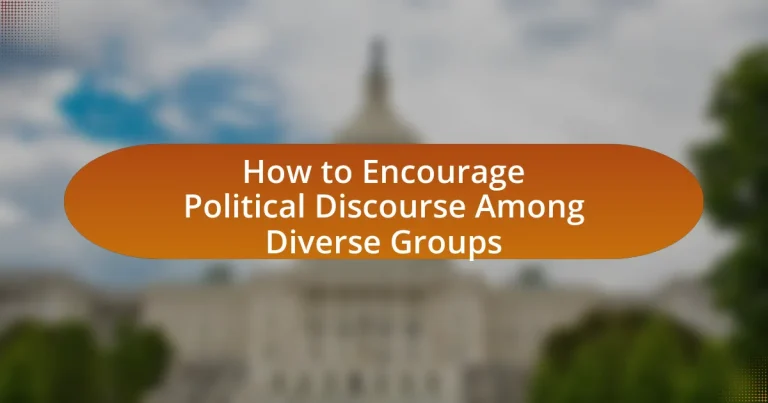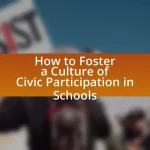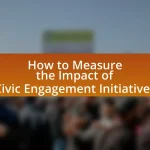Political discourse among diverse groups involves the exchange of ideas and opinions on political issues among individuals from various backgrounds and cultures. This article explores the significance of such discourse in enhancing democratic participation and social cohesion, highlighting how cultural differences, language barriers, and social networks influence political communication. It discusses strategies to encourage inclusive dialogue, the role of education in fostering political engagement, and the challenges posed by biases and misinformation. Additionally, the article outlines practical tips for enhancing respectful political discussions, emphasizing the importance of active listening and clear communication in creating a constructive environment for dialogue.
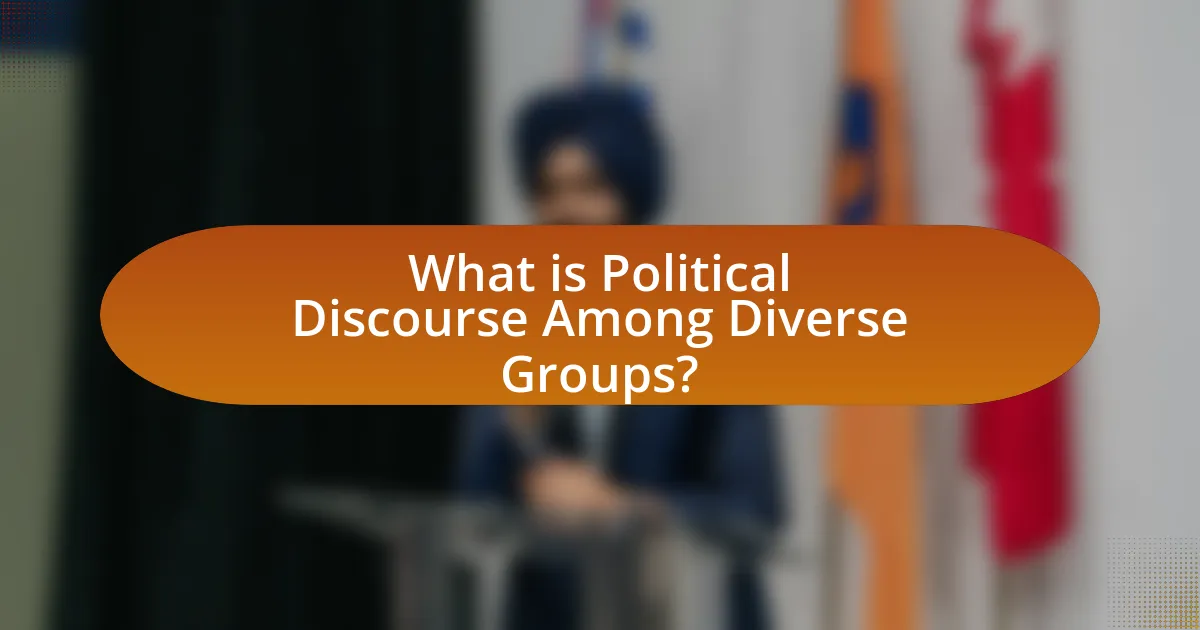
What is Political Discourse Among Diverse Groups?
Political discourse among diverse groups refers to the exchange of ideas, opinions, and arguments regarding political issues among individuals from different backgrounds, cultures, and perspectives. This type of discourse is essential for fostering understanding and collaboration in a pluralistic society, as it allows participants to articulate their viewpoints while also engaging with differing opinions. Research indicates that such discourse can enhance democratic participation and social cohesion, as evidenced by studies showing that inclusive dialogue leads to more informed decision-making and greater community engagement.
How does political discourse differ among various cultural backgrounds?
Political discourse varies significantly among different cultural backgrounds due to differing values, communication styles, and historical contexts. For instance, in collectivist cultures, such as many Asian societies, political discussions often emphasize group harmony and consensus, leading to indirect communication and a focus on community welfare. In contrast, individualistic cultures, like those in the United States, prioritize personal expression and direct confrontation, resulting in more open and sometimes contentious debates. Research by Hofstede Insights highlights these cultural dimensions, showing that societies with high power distance may exhibit more hierarchical and formal political discourse, while those with low power distance encourage egalitarian discussions. This cultural framework influences how individuals engage in political conversations, shaping their approaches to debate, persuasion, and consensus-building.
What factors influence political communication in diverse communities?
Political communication in diverse communities is influenced by cultural differences, language barriers, social networks, and media access. Cultural differences shape individuals’ perspectives and values, affecting how they interpret political messages. Language barriers can hinder effective communication, leading to misunderstandings or exclusion from political discourse. Social networks play a crucial role, as individuals often rely on their communities for information and support, which can either facilitate or obstruct political engagement. Additionally, access to media varies among different groups, impacting the dissemination and reception of political information. For instance, research indicates that communities with limited access to digital platforms may struggle to engage in contemporary political discussions, highlighting the importance of equitable media access in fostering inclusive political communication.
How do language and cultural norms shape political discussions?
Language and cultural norms significantly shape political discussions by influencing how individuals express their opinions and interpret messages. Language serves as a tool for framing political issues, where specific terminology can evoke particular emotions or responses, thereby guiding the discourse. For instance, the use of inclusive language can foster a sense of belonging among diverse groups, encouraging participation in political discussions. Cultural norms dictate acceptable forms of communication, which can either facilitate open dialogue or create barriers to understanding. Research indicates that in collectivist cultures, group harmony is prioritized, leading to more indirect communication styles that may obscure direct political critique, while individualistic cultures often embrace direct confrontation, shaping the nature of political debates. This interplay between language and cultural norms ultimately determines the dynamics of political discussions, influencing who participates and how effectively diverse viewpoints are shared.
Why is encouraging political discourse important?
Encouraging political discourse is important because it fosters understanding and engagement among diverse groups, which is essential for a healthy democracy. Political discourse allows individuals to express differing viewpoints, facilitating the exchange of ideas and promoting critical thinking. Research indicates that societies with higher levels of political discourse experience increased civic participation and social cohesion, as evidenced by studies from the Pew Research Center showing that engaged citizens are more likely to vote and participate in community activities. This engagement ultimately leads to more informed decision-making and a stronger democratic process.
What are the benefits of fostering political dialogue in diverse groups?
Fostering political dialogue in diverse groups enhances mutual understanding and promotes collaborative problem-solving. This dialogue allows individuals from various backgrounds to share perspectives, which can lead to more comprehensive solutions to societal issues. Research indicates that diverse groups are more innovative and effective in decision-making processes, as they draw on a wider range of experiences and viewpoints. For instance, a study published in the Harvard Business Review found that teams with diverse members outperform homogenous teams by 35% in terms of creativity and problem-solving capabilities. Thus, fostering political dialogue in diverse groups not only enriches discussions but also leads to more effective governance and community engagement.
How does political discourse contribute to social cohesion?
Political discourse contributes to social cohesion by fostering understanding and collaboration among diverse groups. Engaging in political discussions allows individuals to express their views, share experiences, and find common ground, which is essential for building trust and mutual respect. Research indicates that communities with active political dialogue experience lower levels of social fragmentation and increased civic participation, as seen in studies conducted by the Pew Research Center, which found that inclusive political conversations enhance community ties and promote collective action.
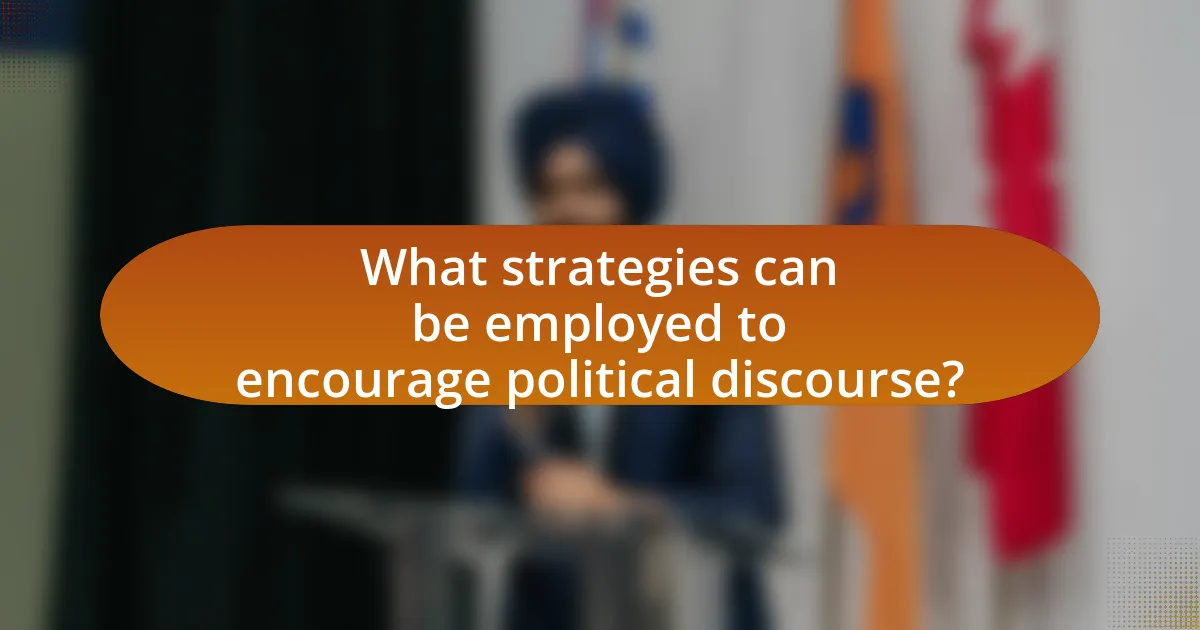
What strategies can be employed to encourage political discourse?
To encourage political discourse, strategies such as fostering inclusive dialogue, utilizing social media platforms, and organizing community forums can be employed. Inclusive dialogue ensures that diverse perspectives are heard, which can be facilitated through structured discussions that promote respect and understanding. Social media platforms serve as effective tools for reaching a broader audience, allowing individuals to share their views and engage in conversations across geographical boundaries. Community forums, such as town hall meetings, provide a space for face-to-face interaction, enabling participants to discuss political issues directly and collaboratively. Research indicates that these methods can significantly enhance civic engagement and understanding among different demographic groups, as evidenced by studies showing increased participation in local governance when community forums are utilized.
How can community events facilitate political discussions?
Community events can facilitate political discussions by providing a structured environment where individuals from diverse backgrounds can engage in dialogue. These events often encourage participation through activities such as town hall meetings, panel discussions, and workshops, which create opportunities for attendees to express their views and listen to differing perspectives. Research indicates that face-to-face interactions during community events can enhance understanding and reduce polarization, as evidenced by studies showing that people are more likely to change their opinions after engaging in direct conversations with others who hold different viewpoints.
What types of events are most effective for engaging diverse groups?
Interactive workshops are the most effective events for engaging diverse groups. These workshops facilitate active participation, allowing individuals from various backgrounds to share their perspectives and experiences. Research indicates that interactive formats, such as group discussions and collaborative activities, enhance understanding and foster connections among participants. For instance, a study by the National Civic League found that community workshops that encourage dialogue and collaboration lead to increased civic engagement and a greater sense of belonging among diverse populations.
How can facilitators create a safe space for dialogue?
Facilitators can create a safe space for dialogue by establishing clear ground rules that promote respect and openness among participants. These rules should include guidelines for active listening, refraining from interrupting, and valuing diverse perspectives. Research indicates that when participants feel their voices are heard and respected, they are more likely to engage in constructive dialogue (Bennett, 2016, “The Importance of Ground Rules in Group Discussions,” Journal of Group Communication). Additionally, facilitators should encourage an inclusive environment by actively inviting contributions from quieter members, which fosters a sense of belonging and safety.
What role does education play in promoting political discourse?
Education plays a crucial role in promoting political discourse by equipping individuals with critical thinking skills and knowledge about civic responsibilities. Through structured curricula that include discussions on political systems, history, and current events, education fosters an environment where diverse viewpoints can be explored and debated. Research indicates that higher levels of education correlate with increased political participation and engagement, as educated individuals are more likely to vote and discuss political issues. For instance, a study by the Pew Research Center found that 61% of college graduates reported discussing politics regularly, compared to 38% of those with a high school education. This demonstrates that education not only informs individuals but also encourages them to engage in meaningful political conversations, thereby enhancing democratic participation.
How can educational institutions encourage open discussions on politics?
Educational institutions can encourage open discussions on politics by creating inclusive environments that promote diverse viewpoints. Implementing structured debate formats and discussion forums allows students to express their opinions while respecting differing perspectives. Research indicates that institutions fostering such environments see increased student engagement and critical thinking skills, as evidenced by a study from the American Association of Colleges and Universities, which found that 80% of students reported feeling more prepared to engage in political discussions when exposed to diverse viewpoints in academic settings.
What curriculum changes can support political engagement among students?
Integrating experiential learning opportunities into the curriculum can significantly enhance political engagement among students. By incorporating simulations, debates, and community service projects related to civic issues, students can actively participate in the political process. Research indicates that experiential learning fosters critical thinking and encourages students to engage with real-world political challenges, thereby increasing their interest and involvement in civic matters. For instance, a study by the Center for Information and Research on Civic Learning and Engagement found that students who participated in service-learning programs were more likely to vote and engage in political discussions.
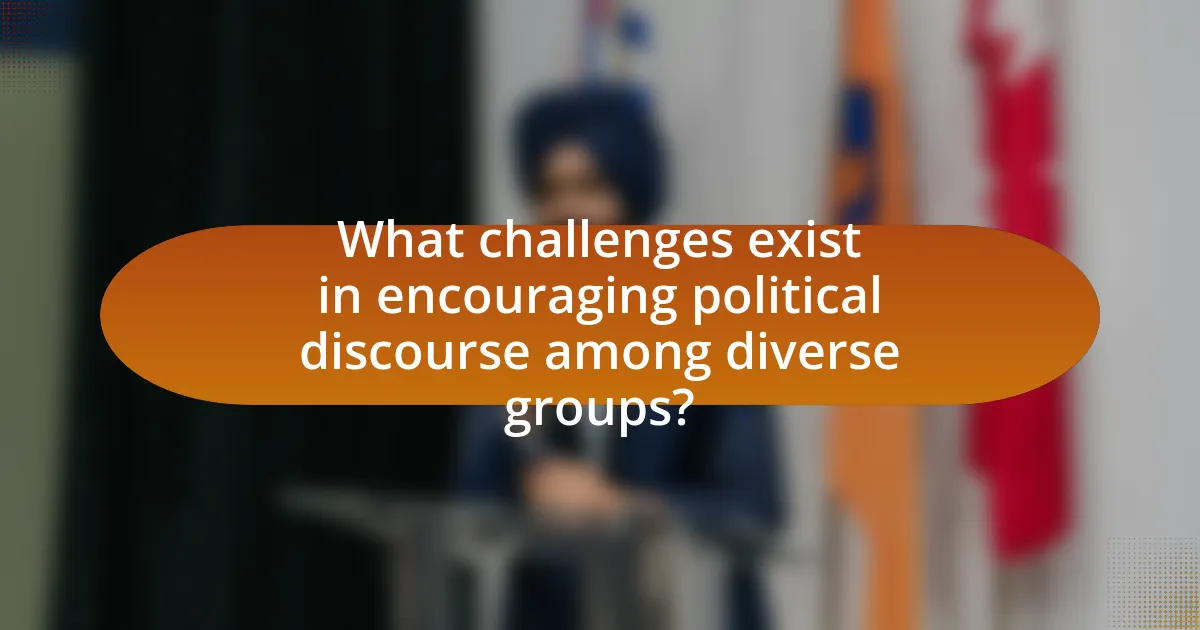
What challenges exist in encouraging political discourse among diverse groups?
Encouraging political discourse among diverse groups faces several challenges, primarily stemming from differing cultural backgrounds, communication styles, and political ideologies. These differences can lead to misunderstandings and conflicts, making it difficult for individuals to engage in constructive dialogue. For instance, research indicates that individuals from collectivist cultures may prioritize group harmony over open debate, while those from individualistic cultures may value direct confrontation, leading to friction in discussions. Additionally, entrenched biases and stereotypes can hinder openness, as individuals may approach conversations with preconceived notions about others’ beliefs. This complexity is further compounded by the influence of social media, which often amplifies polarization and reduces face-to-face interactions, making it harder to foster mutual understanding.
How do biases and stereotypes affect political discussions?
Biases and stereotypes significantly distort political discussions by shaping perceptions and influencing the interpretation of information. These cognitive shortcuts lead individuals to make assumptions about others based on group identity rather than individual merit, often resulting in polarized viewpoints. Research indicates that when people engage in political discourse, their biases can lead to selective exposure to information, reinforcing pre-existing beliefs and creating echo chambers. For instance, a study published in the journal “Political Psychology” by Stroud (2011) found that individuals are more likely to seek out news sources that align with their political views, which perpetuates stereotypes and biases. Consequently, these dynamics hinder constructive dialogue and compromise, ultimately impeding the ability to engage meaningfully with diverse perspectives.
What strategies can mitigate biases in political discourse?
Strategies to mitigate biases in political discourse include promoting media literacy, encouraging diverse perspectives, and fostering respectful dialogue. Media literacy equips individuals to critically evaluate information sources, reducing susceptibility to biased narratives. Encouraging diverse perspectives involves creating platforms where varied viewpoints are shared, which can challenge preconceived notions and reduce echo chambers. Fostering respectful dialogue emphasizes active listening and empathy, allowing participants to engage constructively rather than defensively. Research indicates that these strategies can lead to more balanced discussions and a greater understanding of differing viewpoints, ultimately enhancing the quality of political discourse.
How can individuals recognize and address their own biases?
Individuals can recognize and address their own biases by engaging in self-reflection and seeking feedback from diverse perspectives. Self-reflection involves examining personal beliefs and assumptions, which can be facilitated through journaling or mindfulness practices. Seeking feedback from others, especially those with different backgrounds, helps individuals identify blind spots in their thinking. Research indicates that exposure to diverse viewpoints can reduce bias; for example, a study published in the Journal of Personality and Social Psychology found that individuals who interact with diverse groups are more likely to challenge their preconceived notions. By actively participating in discussions with varied perspectives, individuals can better understand their biases and work towards addressing them.
What are the barriers to effective communication in political discourse?
Barriers to effective communication in political discourse include polarization, misinformation, and lack of empathy. Polarization occurs when individuals or groups become entrenched in opposing viewpoints, making constructive dialogue difficult. Misinformation spreads rapidly, often through social media, leading to misunderstandings and distrust among participants. Lack of empathy hinders the ability to understand differing perspectives, further complicating discussions. Research indicates that these barriers can significantly impede the quality of political discourse, as evidenced by studies showing that polarized environments reduce the likelihood of compromise and collaboration among diverse groups.
How can technology help overcome communication barriers?
Technology can help overcome communication barriers by providing tools that facilitate real-time translation and enhance accessibility. For instance, applications like Google Translate enable individuals who speak different languages to communicate effectively, breaking down linguistic barriers. Additionally, platforms such as Zoom and Microsoft Teams offer features like closed captioning and sign language interpretation, which assist individuals with hearing impairments. Research indicates that the use of technology in communication can lead to a 30% increase in engagement among diverse groups, as it allows for more inclusive participation in discussions.
What role does misinformation play in hindering political dialogue?
Misinformation significantly hinders political dialogue by creating confusion and distrust among individuals. When false or misleading information spreads, it distorts perceptions of reality, leading to polarized views and an inability to engage in constructive discussions. Research indicates that misinformation can reinforce existing biases, making individuals less open to opposing viewpoints, which ultimately stifles meaningful dialogue. For instance, a study published in the journal “Science” found that misinformation can spread faster than factual information, complicating efforts to foster understanding and collaboration among diverse groups.
What practical tips can enhance political discourse among diverse groups?
To enhance political discourse among diverse groups, individuals should prioritize active listening, which fosters understanding and respect. Active listening involves fully concentrating on the speaker, acknowledging their viewpoints, and responding thoughtfully, thereby creating a safe environment for dialogue. Research indicates that when participants engage in active listening, they are more likely to find common ground and reduce misunderstandings, as evidenced by a study published in the Journal of Communication, which found that effective listening significantly improves group cohesion and reduces conflict. Additionally, establishing ground rules for discussions, such as respecting differing opinions and avoiding personal attacks, can further facilitate constructive conversations.
How can individuals prepare for engaging in political discussions?
Individuals can prepare for engaging in political discussions by researching the relevant topics, understanding different perspectives, and practicing active listening. Researching involves gathering information from credible sources to form a well-rounded view of the issues at hand. Understanding different perspectives allows individuals to anticipate counterarguments and engage more effectively. Practicing active listening ensures that participants can respond thoughtfully and respectfully, fostering a constructive dialogue. These preparation steps are essential for meaningful political discourse, as they promote informed and respectful exchanges among diverse groups.
What best practices should be followed to ensure respectful dialogue?
To ensure respectful dialogue, individuals should actively listen, remain open-minded, and communicate clearly. Active listening involves fully concentrating on the speaker, which fosters understanding and reduces misinterpretations. Open-mindedness allows participants to consider differing viewpoints without immediate judgment, promoting a more inclusive atmosphere. Clear communication, characterized by concise and respectful language, helps prevent misunderstandings and keeps the dialogue constructive. These practices are supported by research indicating that respectful interactions lead to more productive discussions and better outcomes in diverse groups, as highlighted in studies on effective communication in multicultural settings.
